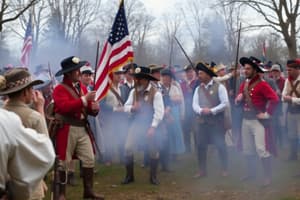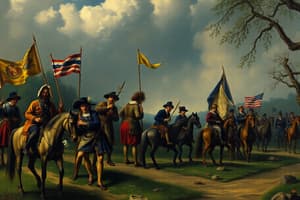Podcast
Questions and Answers
What was one of the main causes of the French and Indian War?
What was one of the main causes of the French and Indian War?
- Disagreements on military alliances
- Disputes over trade agreements
- Conflict over religious differences
- Conflict over territory and resources (correct)
The French and Indian War did not have any significant impact on British colonial policy.
The French and Indian War did not have any significant impact on British colonial policy.
False (B)
Name one key idea of the Enlightenment that influenced American political thought.
Name one key idea of the Enlightenment that influenced American political thought.
Natural rights
The Proclamation of ____ was a direct result of the French and Indian War, aiming to stabilize relations with Native Americans.
The Proclamation of ____ was a direct result of the French and Indian War, aiming to stabilize relations with Native Americans.
Match the following acts with their descriptions:
Match the following acts with their descriptions:
What event marked the beginning of armed conflict in the American Revolution?
What event marked the beginning of armed conflict in the American Revolution?
The Loyalists believed that colonists should seek complete independence from Britain.
The Loyalists believed that colonists should seek complete independence from Britain.
Who was selected as commander in chief of the Continental Army?
Who was selected as commander in chief of the Continental Army?
The __________ Act required American colonists to provide housing for British troops.
The __________ Act required American colonists to provide housing for British troops.
Match each group of colonists with their beliefs:
Match each group of colonists with their beliefs:
Flashcards are hidden until you start studying
Study Notes
French and Indian War
- A pivotal event in the struggle between British and French colonial powers over territory and resources in North America.
- Set the stage for American Revolutionary sentiment by fostering resentment towards British rule.
- Important colonial figures, including George Washington, actively supported British military efforts.
Results of the French and Indian War
- The Treaty of Paris (1763) formalized British territorial gains but also left Britain with significant war debt.
- Increased tensions emerged as Britain shifted from salutary neglect to a more direct governance approach, marked by the Proclamation of 1763.
Foundations of American Government
- Influences included English Common Law, parliamentary systems, and Enlightenment ideas.
- Key Enlightenment principles included:
- Natural rights
- Consent of the governed
- Social Contract
- Ordered liberty
- Separation of church and state
- Separation of powers
Road to American Revolution
- British taxation policies aimed at covering war expenses led to widespread colonial discontent.
- Key Acts:
- Sugar Act
- Stamp Act
- Townshend Acts
- Colonial reactions included boycotts, protests, and violence against British authorities.
Civil Liberties and Rights Violations
- Colonists believed British policies, such as writs of assistance and the Quartering Act, infringed upon their rights.
- Actions like martial law and closing Boston Harbor heightened perceptions of rights violations.
Resistance to British Rule
- Events that marked rising tensions included:
- The Boston Massacre, which involved British troops firing on civilians.
- The Boston Tea Party organized by the Sons of Liberty.
- The First Continental Congress, with representatives from almost all colonies meeting in unity.
- Armed conflict initiated at Lexington and Concord.
Leadership and Ideology during the Revolution
- The Second Continental Congress established the Continental Army, appointing George Washington as commander.
- Enlightenment ideas fueled colonist debates on freedom and justice, pushing increasing resistance to British authority.
Divisions Among Colonists
- Colonists were primarily categorized into three groups:
- Patriots: Advocated for total independence; inspired by Enlightenment thinkers and rallied around leadership from Washington.
- Loyalists: Remained loyal to Britain due to deep cultural and economic connections, believing taxation was justified.
- Neutrals: Colonists who opted for non-involvement in the conflict.
Enslaved People's Role
- Many enslaved individuals viewed the war as an opportunity for freedom, with approximately 10,000 African Americans fighting on the British side.
Factors Leading to Colonial Victory
- Despite British military superiority, American colonists capitalized on their commitment and defensive fighting strategies.
- Significant battles:
- The Battle of Saratoga prompted the Treaty of Alliance with France, negotiated by Benjamin Franklin.
- The decisive Battle of Yorktown, where Washington led forces alongside French troops, secured American victory.
Declaration of Independence
- Reflects Enlightenment ideals concerning natural rights and the political authority underpinning the formation of a unified American government.
Studying That Suits You
Use AI to generate personalized quizzes and flashcards to suit your learning preferences.




